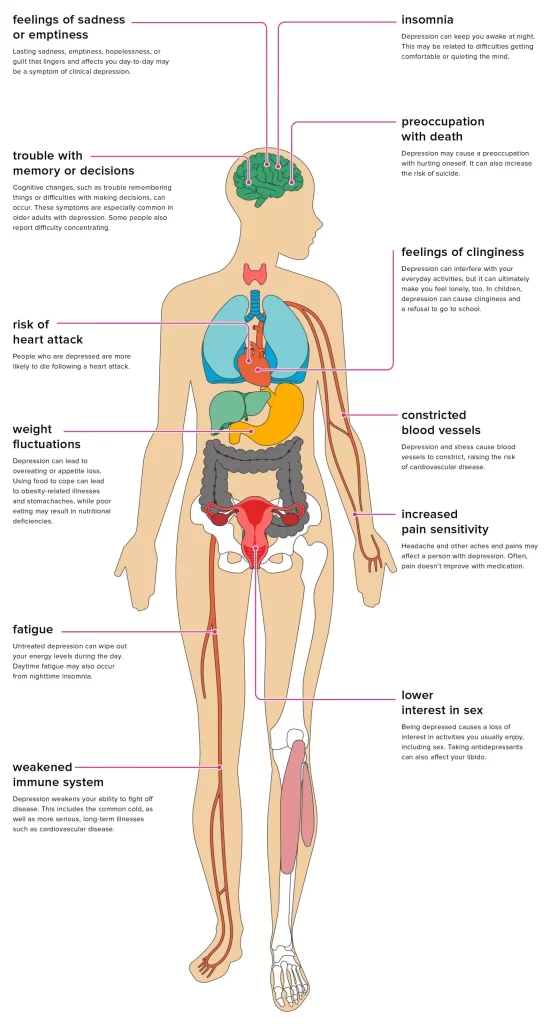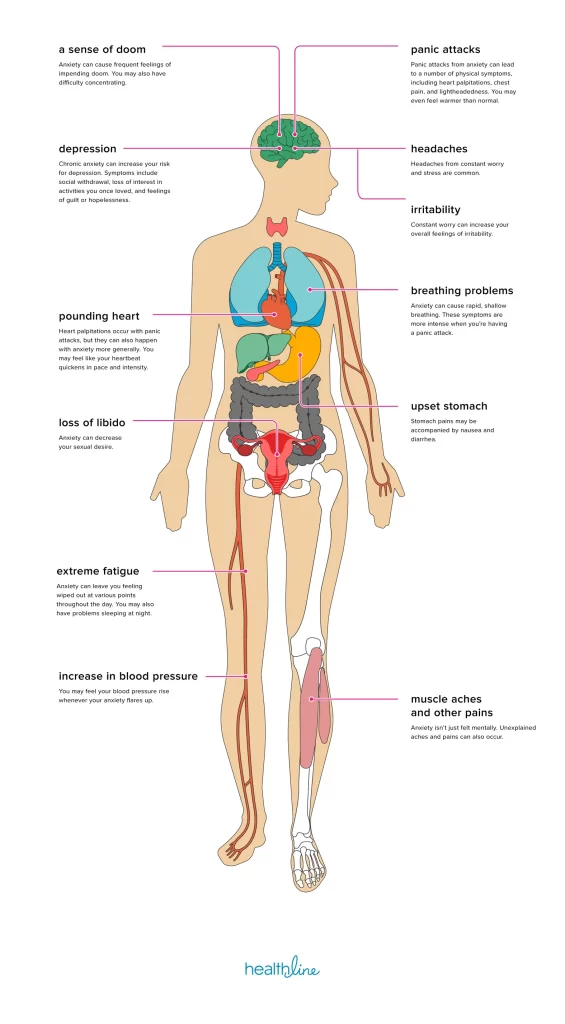Depression
Depression is different from usual mood fluctuations and short-lived emotional
responses to challenges in everyday life. Especially when recurrent and with
moderate or severe intensity, depression may become a serious health condition.
It can cause the affected person to suffer greatly and function poorly at work,
at school and in the family.
At its worst, depression can lead to suicide. Over 700 000 people die due to suicide
every year. Suicide is the fourth leading cause of death in 15-29-year-olds.
Barriers to effective care include a lack of resources, lack of trained health-care
providers and social stigma associated with mental disorders.
“Depression is a common illness worldwide, with an estimated 3.8% of the population affected, including 5.0% among adults and 5.7% among adults older than 60 years. Approximately 280 million people in the world have depression.”
World Health Organization
Are you feeling?
- Low, sad or hopeless
- Little or no interest in doing things
- Feeling tiered or having little energy
- Trouble falling or staying asleep or sleeping too much
- Reduced appetite or overeating
- Trouble in concentration (difficulty in watching TV, reading)
- Feeling bad about yourself (ex that you are a failure)
- Thoughts of harming your self
Just because you experience one or more of these symptoms, it doesn’t mean you’re definitely affected by depression. It’s important to talk to a medical doctor to get a full diagnosis. You need to see a doctor immediately, especially if you are having thoughts of harming yourself.
Dial “1926”for help when you are in a crisis – (National Mental Health helpline)
How Bhawa Wellness can help you, if you are depressed:
- Assessment and diagnosis
- Suggest life style modifications
- Psychotherapy or counselling
- Assess whether you need medications
- Prescription of medications
Anxiety disorders
Anxiety makes it harder to try new things, to take risks in your work or personal life, or sometimes to even leave your own house.
Many people with anxiety feel caged in. They see things they want to do in life but their anxiety keeps them from trying. This can lead to loss of income and unfulfilled potential.

Features of anxiety
- Feeling restless or being on edge
- Irritable
- Poor sleep
- Difficulty in paying attention or concentration- feeling your mind goes blank
- Tense muscles
- Panic attacks- intense fear/anxiety, characterised by heart pounding, shortness of breath, sweating, trembling, fear that you are going to faint/ having a heart attack/die
Types of anxiety disorders
- Generalised anxiety disorder: a long-term condition, in which you worry about a wide range situation in the everyday life, rather than a specific situation
- Panic disorder: recurring panic attacks
- Specific phobia: irrational and extreme of something, like a place or an animal (ex: spiders)
- Difficulty in paying attention or concentration- feeling your mind goes blank
- Tense muscles
- Panic attacks- intense fear/anxiety, characterised by heart pounding, shortness of breath, sweating, trembling, fear that you are going to faint/ having a heart attack/die
Obsessive compulsive disorder (OCD)
Obsession: An unwanted thought, image or urge, which occur enter your mind repeatedly, difficult to stop and feeling disgust/uneasy about it
Compulsion: A repetitive behaviour or mental act that you feel you need to do to temporarily relive the anxiety caused by obsessive thought (ex: washing hands repeatedly, checking windows and doors several times before leaving home)
Post-traumatic stress disorder (PTSD)
- Occurs after a stressful and frightening, incident (ex: serious road traffic accidents,
violent assaults, bomb attack etc) - Frequent memories about the traumatic event, that enter your mind frequently
- Nightmares about the traumatic event
- Flashbacks: is a vivid experience in which you relive some aspects of a traumatic
event or feel as if it is happening right now - Avoiding the reminders of the traumatic event
- Poor sleep, feeling being on edge, difficulty in concentrating
How Bhawa Wellness can help you,
- Assessment and diagnosis
- Assess whether you need medications & prescription
- Relaxation techniques
- Other psychotherapies
Sexual dysfunction
Many people experience problems with sex at some point in their life. It might cause a lot of distress, unhappiness and relationship issues.
Various sexual problems, including:
- Lack of sexual desire
- Impotence (erectile dysfunction): This means fail to get or keep fail to get or keep an erection. It may be caused by physical health or emotional problems. Treatment for
erection problems depends on the cause. If you have erection problems only at some of the, it is more likely to be an emotional problem than a physical health problem. For example, you get an erection when waking up in the morning, but not during sexual activity. - Premature ejaculation: Here the male quickly ejaculates during the intercourse. The causes could again be physical and psychological. Depression, stress, relationship problems and anxiety about sexual performance could associate with premature ejaculation.
- Vaginismus: Vaginismus is a body’s automatic reaction leading to tighten of your vaginal muscle in response to fear, during penetration. You would struggle in vaginal
penetration during the intercourse.
How Bhawa Wellness can help you,
- We cannot provide a full examination since we offer an online session
- We can offer sex therapy once you are diagnosed and excluded physical causes by examination or investigation.
- Sex therapy includes, exploring your problems, exercises and tasks to do with your partner in your own time. Sessions usually last for 30 to 40 minutes. The therapist may advise you to have weekly sessions or to see them less frequently, such as once a month.
Prolonged Grief
Grief is a natural response to the loss of a loved one. For most people, the symptoms of grief begin to decrease over time. However, for a small group of people, the feeling of intense grief persists, and the symptoms are severe enough to cause problems and stop them from continuing with their lives. Prolonged grief disorder is characterized by this intense and persistent grief that causes problems and interferes with daily life.

Symptoms of prolonged grief disorder (APA, 2022) include:
- Identity disruption (such as feeling as though part of oneself has died).
- Marked sense of disbelief about the death.
- Avoidance of reminders that the person is dead.
- Intense emotional pain (such as anger, bitterness, sorrow) related to the death.
- Difficulty with reintegration (such as problems engaging with friends, pursuing
interests, planning for the future). - Emotional numbness (absence or marked reduction of emotional experience).
- Feeling that life is meaningless.
- Intense loneliness (feeling alone or detached from others).
How Bhawa Wellness can help you,
- Assessment and diagnosis
- Assessment whether you are suffering from depression, anxiety or PTSD as well
- Grief therapy and grief counselling
Addiction
Types of anxiety disorders
- Having strong desire to take the substance
- Continue to use despite knowing the harmful effects of the substance
- Physical and psychological effects after stopping or reducing the substance
- Needing more of the substance to achieve the desired effects
- Physical and mental health issues due to use of substance
- Problems in relationships, job, finances and legal aspects
Long-term effects of drug addiction
- Stroke, seizure and permanent brain damage
- Heart disease
- Weight loss and significant changes in appetite
- Liver, lung and kidney damage
- Compromised immune system and frequent infections
- Personality changes
- Confusion, memory problems and difficulty in making decisions
- Feelings of dread and paranoia
- Decreased impulse control
- Excessive agitation and aggressiveness
- Poor judgement
- Damage to your personal relationships
- Hallucinations
- Arrests and jail time
- Death
How Bhawa Wellness can help you,
- Counselling/ psychotherapy for substance addiction
- Assess whether you have other mental health conditions
Difficulties in relationships
- When we experience difficulties in a relationship with the spouse or partner, it can affect our mental health.
- Disagreements are a normal part of relationships, but if you or partner fight/argue frequently, and find it difficult to resolve the arguments, it can affect the mental health of you, your children and the partner.
“To start fixing issues in a relationship, the highest levels of success depend on each partner’s willingness to show up and take ownership of their contribution. Having an impartial lens of a professional helps to navigate this journey, but even individually-carving out space, having real conversations about issues, and always bringing creative solutions to the table can start the trajectory in a positive direction.”

Remembering to implement any or all of the following can be beneficial in any relationship:
- Say please and thank you
- Express dissatisfaction without using profanity or name-calling
- Schedule regular date nights, even if they’re during the day or at home
- Be proactive about pleasing your partner sexually
- Spend time asking questions about each other’s wants and needs
Take time outs from debates that seem to be turning into arguments
How Bhawa Wellness can help you,
- Assess if you have mental health conditions related to above issues
- Couple therapy/ counselling
Mental health conditions in children and adolescents
- School refusal: the child is reluctant to go to school. And the child may complaint vague physical symptoms such as non-specific tummy pain
- Addiction to games: as a parent you might be worried about your child’s screen time and behaviours your child experiences around gaming.
- Stress around the exams: mood bursts and outbursts are more likely to happen during this period. Features of struggling include difficulty in concentration, poor sleep, poor appetite and changes in behavior
- Depression: feeling down, irritable, poor sleep, deterioration of studies, lack of motivation, low self-esteem, feeling hopeless
- Substance addiction
How Bhawa Wellness can help you,
- Assess your child
- Parental guidance/ education
- Psychotherapy/ counselling to your child
